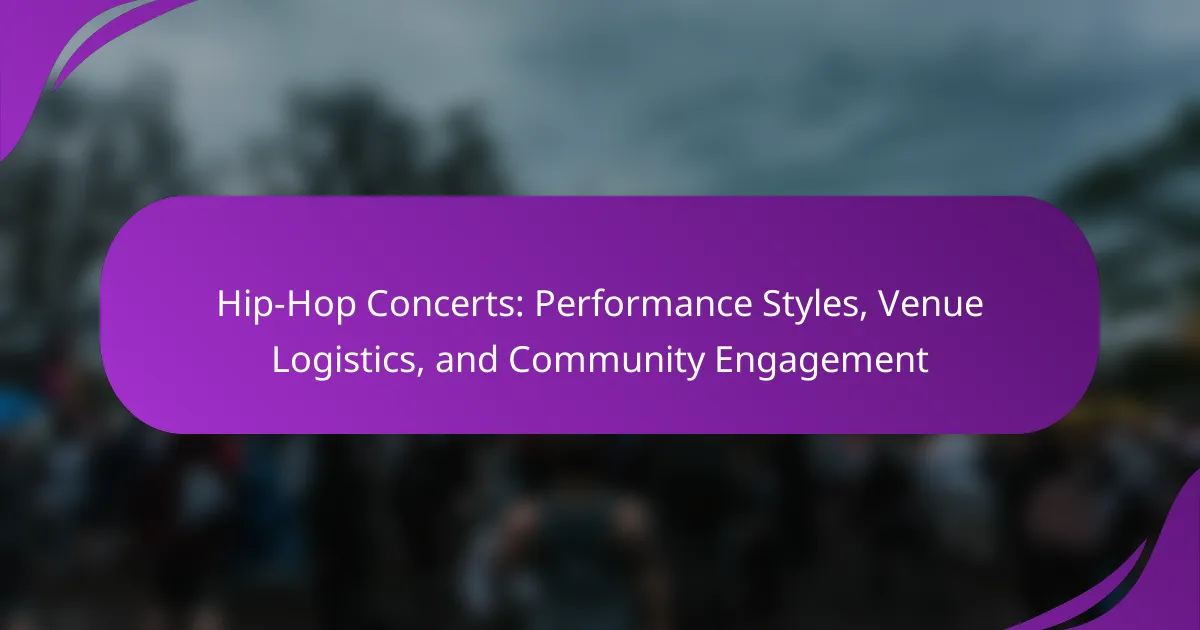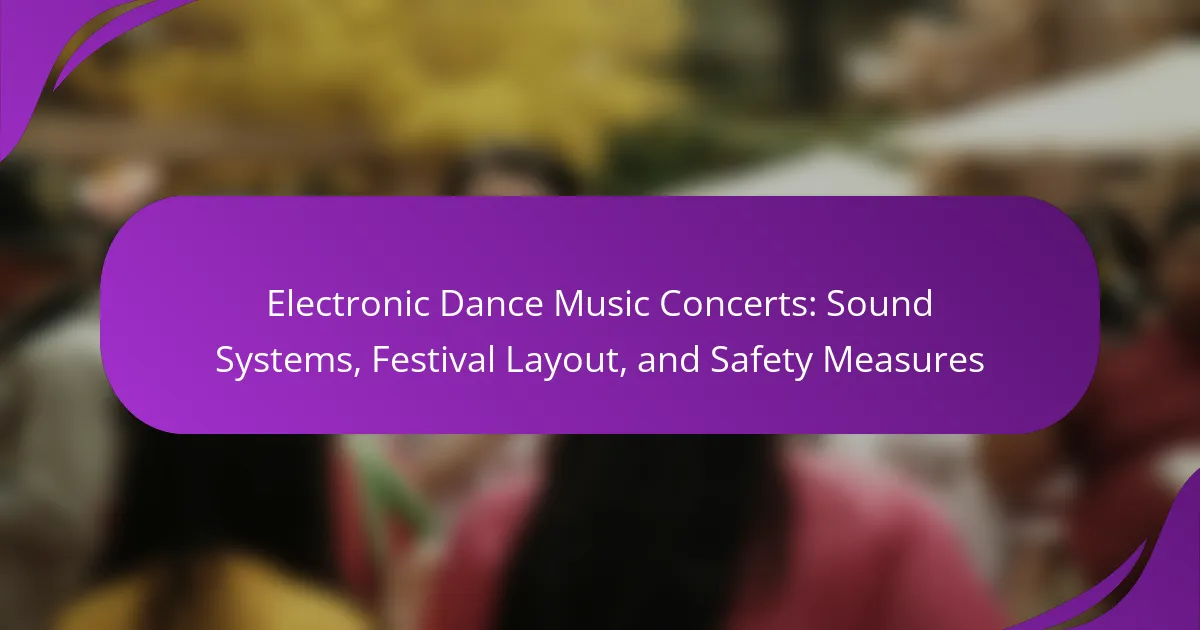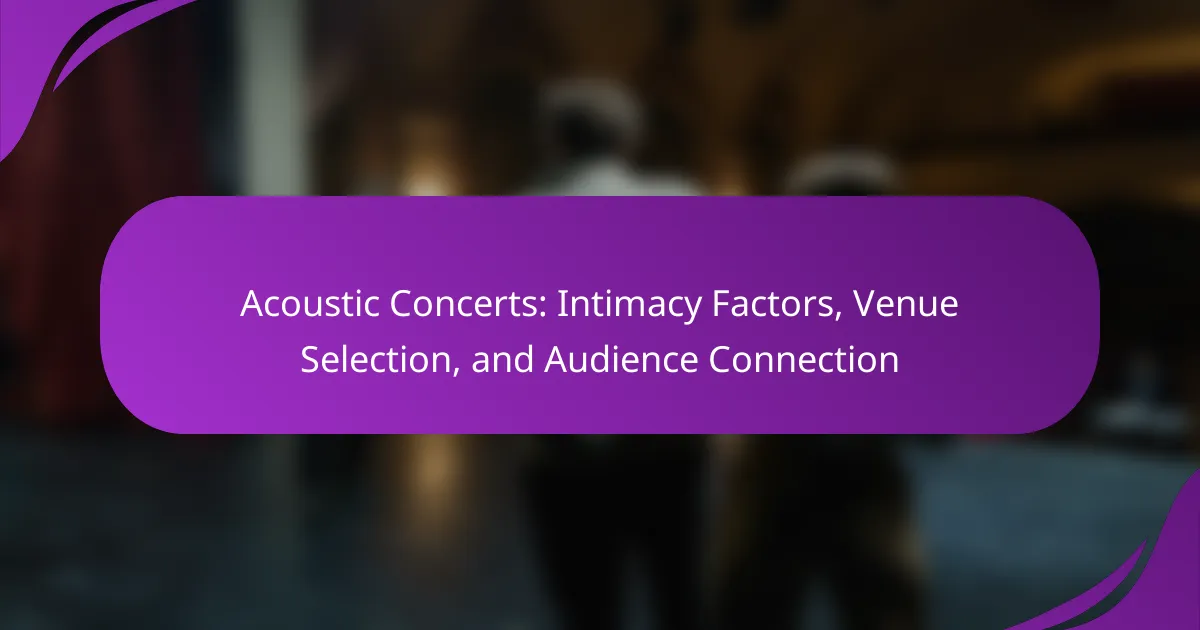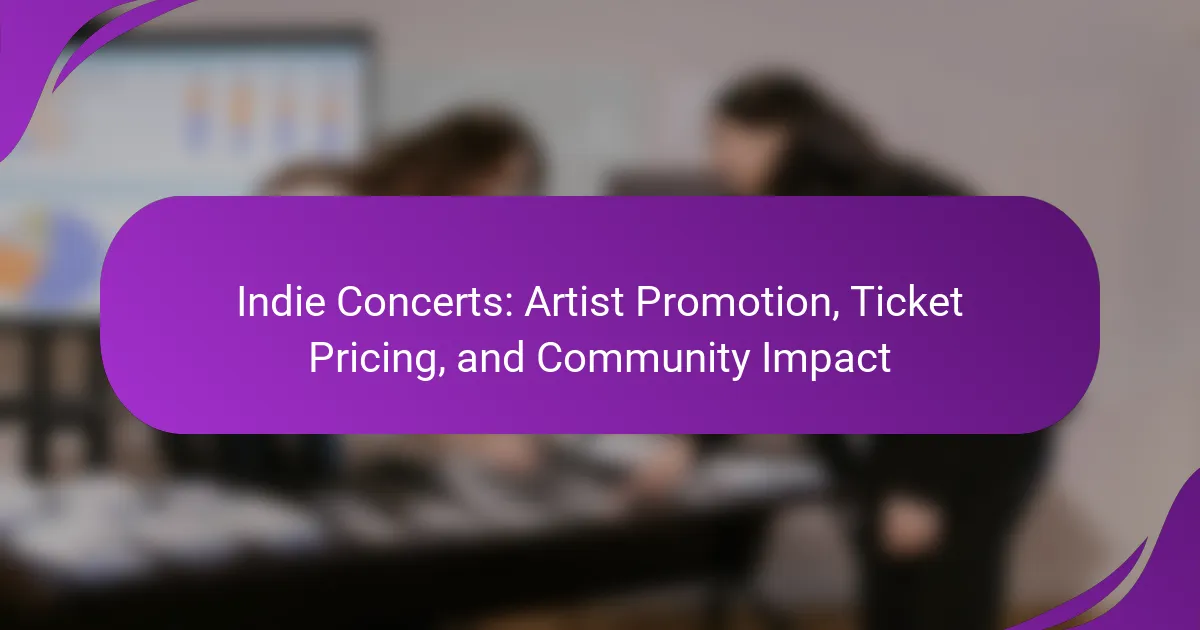Tribute concerts are live performances dedicated to honoring specific artists or bands by recreating their music through various artists covering original songs. These events celebrate the legacy of the honoree while entertaining fans, often featuring popular hits and iconic tracks, and may also serve charitable purposes. The selection of artists for tribute concerts is influenced by factors such as popularity, musical style, performance authenticity, and audience demographics. Effective marketing strategies, including targeted social media campaigns and partnerships with influencers, play a crucial role in maximizing audience appeal and ticket sales. Audience engagement significantly impacts the success of tribute concerts, with nostalgia driving attendance and satisfaction among fans.
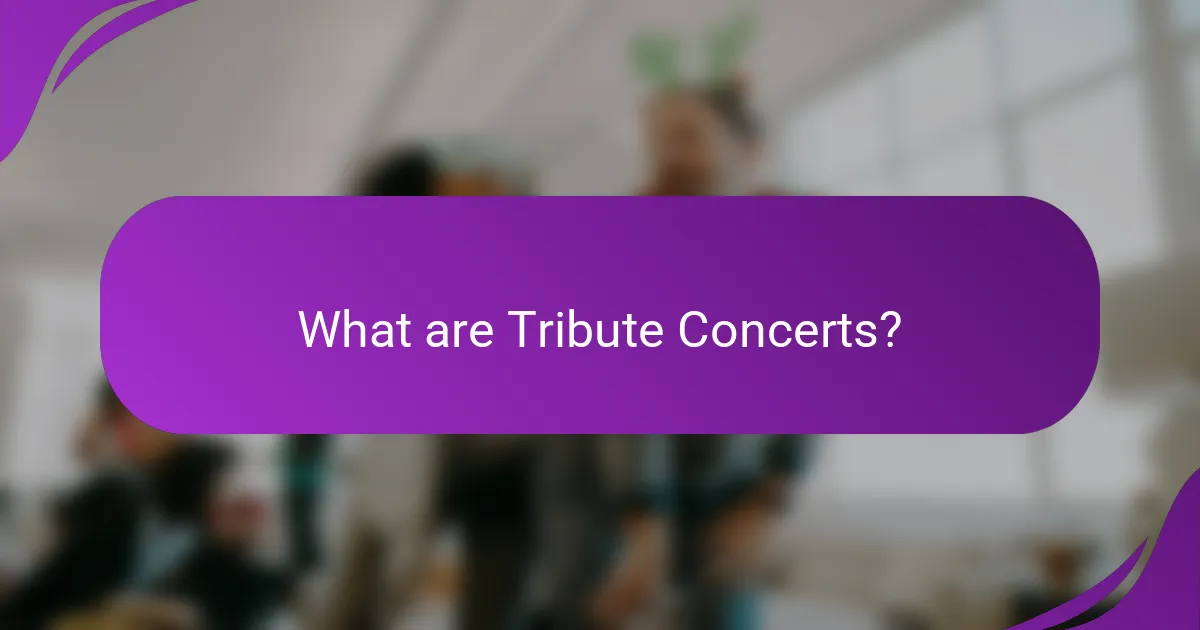
What are Tribute Concerts?
Tribute concerts are live performances that honor a specific artist or band by recreating their music. These concerts typically feature various artists covering the original songs. Tribute concerts aim to celebrate the legacy of the honoree while entertaining fans. They often include performances of popular hits and iconic tracks. Many tribute concerts are organized to raise funds for charitable causes. The format allows fans to experience the music of their favorite artists in a live setting. Tribute concerts can attract large audiences, showcasing the enduring popularity of the original music. Such events often bring together fans of different generations, fostering a sense of community.
How do Tribute Concerts differ from regular concerts?
Tribute concerts differ from regular concerts primarily in their focus on honoring specific artists or bands. These events feature performances that replicate the music and style of the original artists. Tribute concerts often include cover bands or artists who specialize in performing the songs of the honoree. In contrast, regular concerts typically showcase original music by the performing artist.
Tribute concerts aim to evoke nostalgia and celebrate the legacy of the artist. They often attract fans who seek to relive the experience of seeing the original artist live. Regular concerts, on the other hand, focus on promoting new material and the artist’s current work.
Statistically, tribute bands have gained popularity, with many achieving significant followings. For example, the “British Invasion” tribute bands have seen increased attendance at venues, reflecting audience interest in this genre. This demonstrates that tribute concerts serve a unique niche in the music industry, distinct from traditional concerts.
What defines a Tribute Concert?
A tribute concert is an event that honors a specific artist, band, or musical genre. These concerts typically feature performances of the honoree’s songs by various artists or tribute acts. Tribute concerts aim to celebrate the legacy and influence of the original artist. They often attract fans who wish to experience the music in a live setting. Many tribute concerts are organized as fundraisers or memorials. Historical examples include the Concert for George in 2002, honoring George Harrison. These events can vary in scale, from small local shows to large festivals. The popularity of tribute concerts reflects the enduring impact of the original artists on music culture.
What are the key elements of a successful Tribute Concert?
The key elements of a successful Tribute Concert include careful artist selection, effective marketing strategies, and strong audience engagement. Artist selection should focus on performers who authentically replicate the original artists’ style and music. Successful tribute bands often have a proven track record and a dedicated fan base. Marketing strategies must effectively reach the target audience through social media, local advertising, and partnerships with venues. Engaging the audience during the concert enhances the experience, fostering a connection to the original artist. High-quality production values, including sound and lighting, are essential for creating an immersive atmosphere. Additionally, choosing a suitable venue that accommodates the expected audience size contributes to the concert’s success. These elements collectively ensure a memorable and impactful tribute concert experience.
Why are Tribute Concerts popular among audiences?
Tribute concerts are popular among audiences because they evoke nostalgia and celebrate beloved artists. Fans often seek connections to their favorite music and memories associated with it. Tribute performances allow audiences to experience the music of iconic artists in a live setting. This creates a sense of community among fans who share similar tastes.
Moreover, tribute concerts often feature skilled musicians who closely replicate the original artists’ styles. This attention to detail enhances the audience’s experience, making it feel authentic. According to a survey by Pollstar, tribute bands account for a significant portion of live music events, indicating strong audience interest.
Additionally, tribute concerts provide an opportunity for younger generations to discover classic music. This cross-generational appeal broadens the audience base. The combination of nostalgia, community, authenticity, and discovery contributes to the popularity of tribute concerts.
What emotional connections do audiences have with Tribute Concerts?
Audiences have deep emotional connections with tribute concerts due to nostalgia and shared experiences. Tribute concerts often celebrate beloved artists, evoking memories of significant life moments. Fans connect through the music that shaped their youth or important events. These concerts create a sense of community among attendees who share similar musical tastes. Emotional responses are heightened when songs resonate with personal stories or collective memories. According to a study published in the Journal of Music Therapy, live music experiences can enhance emotional well-being and social bonding. Tribute concerts provide a platform for fans to honor the legacy of their favorite artists, fostering a collective emotional experience.
How do Tribute Concerts celebrate iconic artists?
Tribute concerts celebrate iconic artists by honoring their music and legacy through live performances. These events feature cover bands or artists performing the original songs of the celebrated musician. Tribute concerts often recreate the atmosphere of the artist’s performances, including stage setups and costumes. They attract fans who wish to relive the experience of seeing the artist live. Many tribute concerts also raise funds for charitable causes, further enhancing their significance. Notably, events like the “Concert for George” in 2002 honored George Harrison, showcasing his impact on music. These concerts serve as a collective remembrance, allowing fans to connect over shared appreciation.
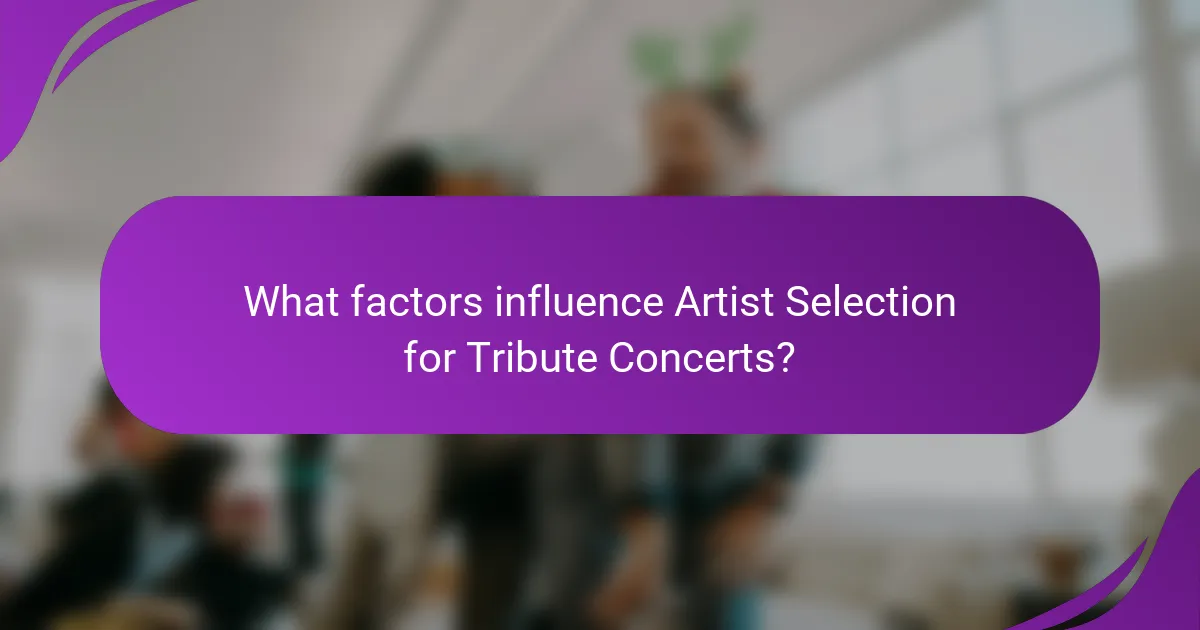
What factors influence Artist Selection for Tribute Concerts?
Artist selection for tribute concerts is influenced by several key factors. The first factor is the artist’s popularity. High-profile artists attract larger audiences. The second factor is the artist’s musical style. It should align with the original artist being honored. The third factor is the artist’s ability to replicate the original’s performance style. Authenticity enhances audience experience. The fourth factor is the artist’s previous performance history. Established performers often have a track record of successful tribute shows. The fifth factor is audience demographics. Understanding the target audience helps in selecting relatable artists. Lastly, logistical considerations such as availability and cost also play a significant role in the selection process. These factors collectively ensure that the tribute concert resonates with fans and achieves commercial success.
How is the selection process for tribute artists conducted?
The selection process for tribute artists is typically conducted through auditions and evaluations. Event organizers often seek artists who can closely replicate the original artist’s style and performance. This includes assessing vocal ability, stage presence, and visual likeness. Auditions may involve live performances or video submissions. Feedback from industry professionals can also influence the selection. Additionally, past performance history and audience reception may be considered. Many tribute acts gain recognition through social media and promotional events, which can impact their selection for larger concerts.
What criteria are used to choose tribute artists?
The criteria used to choose tribute artists include vocal ability, stage presence, and likeness to the original artist. Vocal ability ensures that the tribute artist can accurately replicate the original’s sound. Stage presence is essential for engaging the audience and creating an authentic concert experience. Likeness to the original artist in terms of appearance and mannerisms enhances the overall tribute. Additionally, experience in live performances and familiarity with the original artist’s repertoire are important factors. These criteria help ensure that tribute concerts resonate with fans and maintain high entertainment value.
How does the artist’s popularity affect selection?
An artist’s popularity significantly influences selection for tribute concerts. Higher popularity often leads to increased audience interest and ticket sales. Popular artists attract larger crowds, enhancing the event’s overall appeal. This can result in more substantial sponsorship and media coverage. Additionally, event organizers prioritize artists with a proven track record of drawing fans. Research indicates that tribute concerts featuring well-known artists generate higher revenue compared to lesser-known acts. Therefore, an artist’s popularity is a critical factor in determining their selection for tribute events.
What role do original artists play in the selection process?
Original artists serve as key influencers in the selection process for tribute concerts. Their involvement ensures authenticity and respect for the original material. They can provide insights into the essence of their music and the intended message behind it. Original artists also help in endorsing tribute acts, increasing credibility. Their participation can attract fans and media attention, enhancing marketing efforts. Additionally, original artists may offer guidance on song selection and performance style. This collaboration fosters a connection between tribute performers and the original work. Ultimately, their role enriches the tribute experience for audiences.
How do original artists influence the tribute experience?
Original artists influence the tribute experience by shaping the audience’s expectations and emotional connections. Their music, style, and persona set a benchmark for tribute performances. Tribute acts often strive to replicate the original artist’s sound and stage presence. This replication aims to evoke nostalgia and admiration among fans. The original artist’s legacy impacts the tribute’s authenticity and credibility. For instance, well-known artists like Freddie Mercury inspire tribute bands to capture his unique vocal style and flamboyant performance. The original artist’s influence also extends to song selection and arrangement in tribute shows. Fans often attend tributes to relive the experience of seeing the original artist live. Overall, the presence of original artists in popular culture enhances the significance of tribute performances.
What are the implications of using original artists in Tribute Concerts?
Using original artists in tribute concerts can enhance authenticity and audience engagement. Original artists bring their unique interpretation and emotional connection to the material. This can lead to a richer experience for attendees who appreciate the genuine performance. Furthermore, original artists often attract larger audiences due to their established fan base. For example, concerts featuring original artists like Paul McCartney or Elton John draw significant crowds. Their presence can also increase media coverage and promotional opportunities. Additionally, original artists may provide insights or anecdotes that deepen the audience’s appreciation of the tribute. Overall, their involvement can elevate the event’s profile and financial success.
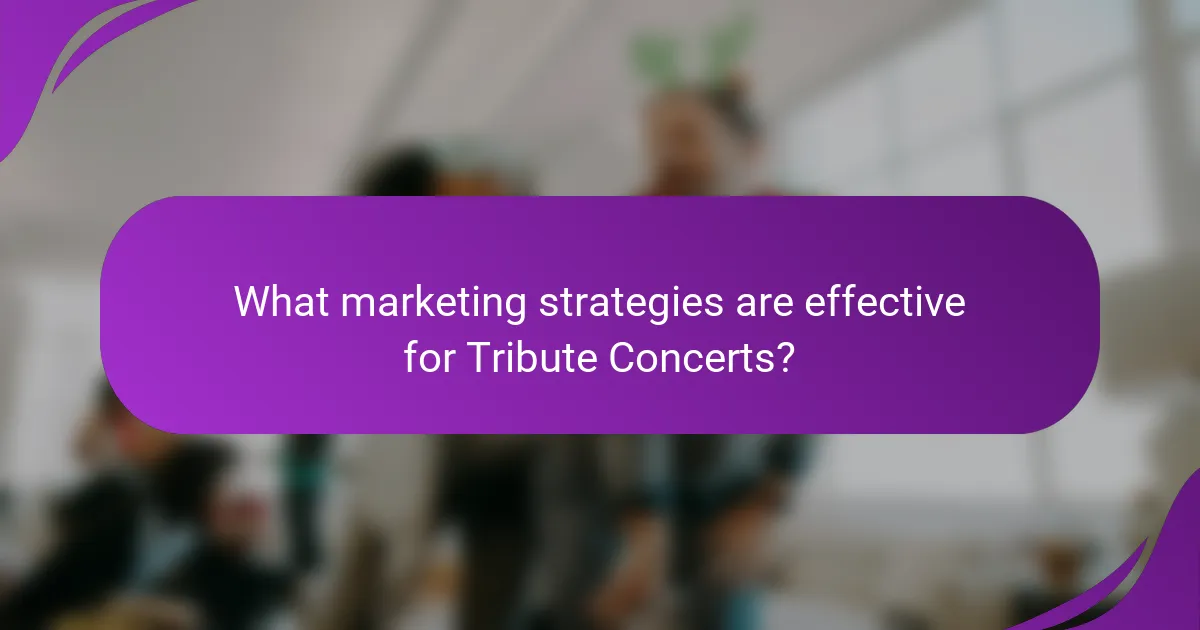
What marketing strategies are effective for Tribute Concerts?
Effective marketing strategies for tribute concerts include targeted social media campaigns, partnerships with local influencers, and email marketing. Social media platforms allow for direct engagement with fans. Visual content showcasing past performances can attract interest. Collaborating with local influencers can expand reach to new audiences. Email marketing keeps potential attendees informed about upcoming events. Offering early bird ticket discounts can incentivize purchases. Utilizing event listing websites increases visibility. Creating engaging promotional videos can enhance appeal. These strategies have been proven to increase ticket sales and audience engagement.
How can social media be leveraged for marketing Tribute Concerts?
Social media can be leveraged for marketing tribute concerts by creating engaging content and fostering community interaction. Platforms like Facebook, Instagram, and Twitter allow promoters to share event details, artist lineups, and behind-the-scenes content. Engaging visuals and video snippets of past performances can attract attention and generate excitement.
Targeted ads on these platforms can reach specific demographics interested in the tribute artists. Hashtags related to the concert and the artists can enhance discoverability. Collaborating with influencers who resonate with the tribute genre can expand reach and credibility.
User-generated content, such as fan testimonials and photos, can further promote the event. According to a study by Statista, 54% of social media users browse platforms to discover new events. This statistic highlights the effectiveness of social media in reaching potential attendees.
What platforms are most effective for promoting Tribute Concerts?
Social media platforms are most effective for promoting tribute concerts. Facebook allows event creation and targeted advertising. Instagram provides visual appeal through photos and videos. Twitter enables real-time updates and engagement with fans. YouTube hosts promotional videos and past performances. Event platforms like Eventbrite facilitate ticket sales and audience reach. Email marketing helps in directly communicating with interested audiences. These platforms collectively enhance visibility and engagement for tribute concerts.
How do audience demographics influence marketing strategies?
Audience demographics significantly influence marketing strategies by determining target segments and tailoring messages. Marketers analyze age, gender, income, and location to identify preferences. For instance, younger audiences may favor social media campaigns, while older demographics might respond better to traditional advertising. Additionally, income levels affect pricing strategies for tickets and merchandise. Understanding these demographics helps in selecting appropriate artists that resonate with the audience. Research indicates that targeted marketing can increase engagement by up to 50%. By aligning marketing efforts with demographic insights, businesses can enhance effectiveness and drive attendance at events like tribute concerts.
What partnerships can enhance marketing efforts for Tribute Concerts?
Strategic partnerships with local businesses, music venues, and media outlets can enhance marketing efforts for Tribute Concerts. Collaborating with local businesses can provide cross-promotion opportunities. For instance, restaurants can offer discounts to concert ticket holders. Partnering with music venues can ensure better visibility and access to dedicated audiences. Media outlets can help in reaching wider demographics through advertising and coverage. Additionally, collaborations with influencers and local artists can create buzz and attract more attendees. Research shows that events with strong local partnerships see a 30% increase in attendance.
How can collaborations with local businesses boost attendance?
Collaborations with local businesses can significantly boost attendance at tribute concerts. These partnerships create mutual benefits through cross-promotion. Local businesses can advertise the concert to their customers, expanding the reach to potential attendees. They may offer discounts or incentives for concert tickets, encouraging their clientele to participate. Additionally, local businesses can provide sponsorship, enhancing the event’s visibility and credibility. This strategy can attract a larger audience, as community members often support local initiatives. According to a study by the National Endowment for the Arts, community engagement through local partnerships increases event attendance by up to 30%.
What role do sponsorships play in marketing Tribute Concerts?
Sponsorships play a crucial role in marketing tribute concerts. They provide financial support that can enhance the event’s production quality. This financial backing allows for higher-profile venues and better marketing campaigns. Sponsors also help in reaching wider audiences through their established networks. Their branding at events increases visibility for both the concert and the sponsor. In 2020, the global sponsorship market was valued at approximately $62.7 billion, highlighting its significance. Additionally, collaborations with well-known brands can attract fans of those brands to the concert. Overall, sponsorships are integral to the success and promotion of tribute concerts.
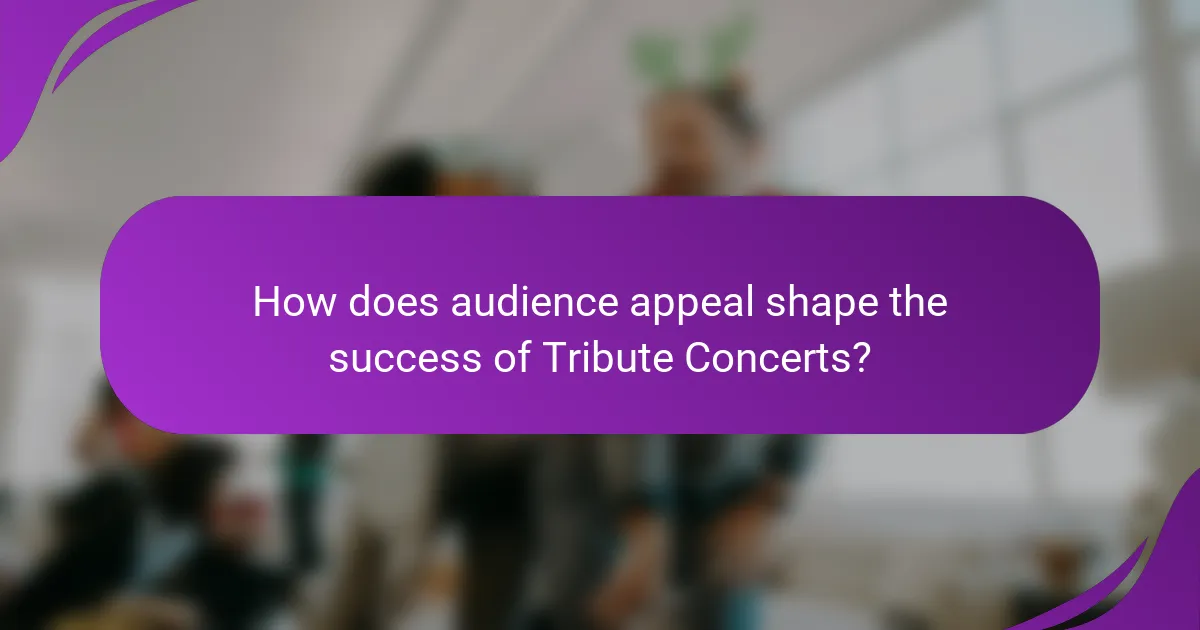
How does audience appeal shape the success of Tribute Concerts?
Audience appeal significantly shapes the success of tribute concerts. It determines ticket sales and overall attendance. Engaging performances resonate with fans of the original artists. This connection enhances audience satisfaction and loyalty. High levels of nostalgia often drive audience appeal. Tribute acts that capture the essence of the original artists attract larger crowds. According to a study by the University of Southern California, tribute concerts with strong audience engagement see a 30% increase in repeat attendance. This demonstrates that audience appeal directly influences financial success and long-term viability.
What factors contribute to audience engagement at Tribute Concerts?
Audience engagement at tribute concerts is influenced by several key factors. The selection of artists plays a crucial role. Well-known tribute bands attract more fans. Authenticity in performance enhances audience connection. Marketing strategies also significantly impact attendance and engagement. Effective use of social media can create buzz and anticipation. The venue atmosphere contributes to the overall experience. Audience participation, such as sing-alongs, fosters a communal vibe. Timing and scheduling of events can affect turnout and engagement levels.
How does nostalgia influence audience appeal?
Nostalgia significantly influences audience appeal by evoking emotional connections to past experiences. This emotional response can enhance engagement and loyalty towards events like tribute concerts. Research indicates that nostalgia can trigger positive feelings and memories, making audiences more receptive to the content presented. For example, a study published in the Journal of Consumer Research found that nostalgic feelings can increase consumer spending and willingness to engage with brands. This suggests that when audiences feel nostalgic, they are more likely to attend tribute concerts and connect with the artists being honored. Thus, nostalgia serves as a powerful tool in marketing strategies, enhancing audience attraction and participation in events.
What interactive elements enhance the audience experience?
Interactive elements that enhance audience experience include live polling, social media integration, and audience participation activities. Live polling allows attendees to express their preferences in real-time. This engagement increases excitement and involvement during the event. Social media integration encourages sharing experiences online, creating a sense of community. Audience participation activities, such as sing-alongs or dance-offs, foster a connection between performers and attendees. These elements have been shown to improve overall satisfaction and enjoyment at events. Research indicates that interactive features can increase audience retention and engagement by up to 40%.
What are the best practices for ensuring audience satisfaction?
The best practices for ensuring audience satisfaction in tribute concerts include selecting popular and relevant artists. Engaging artists who resonate with the audience enhances their experience. Providing high-quality performances is crucial. Audiences expect professional sound and lighting. Effective marketing strategies also play a significant role. Clear communication about the event details builds anticipation. Gathering audience feedback post-event helps improve future concerts. Implementing changes based on this feedback shows responsiveness and care. Finally, creating a welcoming atmosphere contributes to overall satisfaction. A friendly environment encourages attendees to return for future events.
How can feedback be effectively gathered from concert attendees?
Feedback can be effectively gathered from concert attendees through various methods. Surveys are a common approach, allowing attendees to provide structured feedback. These surveys can be distributed via email or mobile apps. Feedback forms can also be provided at the venue, encouraging immediate responses. Social media platforms enable attendees to share their experiences publicly. Engaging with attendees through post-concert discussions can yield qualitative insights. Incentives, such as discounts or giveaways, can increase participation rates in feedback collection. According to a study by Eventbrite, 70% of attendees prefer providing feedback through digital channels. This emphasizes the importance of utilizing technology for effective feedback gathering.
What strategies can be implemented to improve future Tribute Concerts?
To improve future Tribute Concerts, organizers can implement several strategies. First, enhancing artist selection is crucial. Selecting artists with a strong fan base increases ticket sales. Additionally, involving original artists or their family members can create authenticity.
Next, marketing strategies should be refined. Utilizing social media platforms for targeted advertising can reach a wider audience. Collaborating with influencers can amplify promotional efforts. Offering early bird discounts can incentivize early ticket purchases.
Moreover, enhancing audience engagement is vital. Incorporating interactive elements, like live polls during performances, can increase participation. Providing exclusive merchandise can enhance the overall experience.
Finally, gathering post-event feedback is essential. Analyzing attendee responses can guide improvements for future events. This data-driven approach ensures that future Tribute Concerts align with audience expectations.
Tribute concerts are live performances that honor specific artists or bands by recreating their music through various artists covering original songs. This article examines the key elements that define tribute concerts, including their distinct characteristics compared to regular concerts, the factors influencing artist selection, effective marketing strategies, and the emotional connections audiences have with these events. It also highlights the importance of audience appeal and engagement in ensuring the success of tribute concerts, along with best practices for improving future events. Through this comprehensive overview, the article provides insights into the dynamics of tribute concerts within the music industry.
